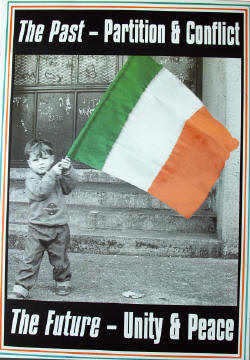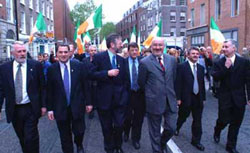 |
Irisch
Republikanische Solidarität
|
 |
Victims of British-inspired bombing campaign seek justice
A group representing the bereaved families and victims of the 1974
Dublin and Monaghan bombings have repeated their call on the British
and Irish governments to come clean on the atrocities.
Thirty three people were killed and hundreds injured when four separate
no-warning bombs were exploded in Dublin and Monaghan in attacks which
were designed to turn people in the 26 Counties away from the national
struggle.
Justice for the Forgotten will mark the 29th anniversary of the blasts
tomorrow [Saturday] with a wreath-laying ceremony at a memorial to the
victims in Dublin's Talbot Street, followed by Mass at the
Pro-Cathedral.
Members yesterday said that John Stevens' recent assertion that
widespread collusion took place between British security forces and
unionist paramilitaries added to suspicions that British agents were
behind the attacks.
The group's legal representative, Cormac O'Dulachain, said that the
governments' ongoing discussions about the peace process could not
reach a satisfactory conclusion until the full facts surrounding the
attacks were made public.
"There has been plenty of talk about the peace process in recent
months
but no discussions about the victims' needs and the need to establish
the truth about what occurred," he said.
"The fact is that when the relatives' group first got together 10
years
ago they were frustrated by a veil of secrecy. The Dublin and Monaghan
bombings were part of a deliberate plan to create mass slaughter in a
civilian area.
"The conflict may be over for the governments, the political parties
and the (paramilitary) organisations, but for the individuals it cannot
be over until the truth is known."
Chairwoman Bernie McNally, who was seriously injured by the Talbot
Street car bomb, said a decade had passed since a British TV
documentary first asserted that British forces had colluded with
unionist paramilitaries in the bomb attacks.
Ms McNally also revealed that Justice Henry Barron's report on the
atrocity is expected to be published in September.
"We do not expect Justice Barron to be able to expose the full truth.
He has not had the powers to do so, he has not had one tenth of the
powers or resources that Stevens had. He has not had the clear and full
cooperation of the British government as promised by the British Prime
Minister Tony Blair," she said.
Ms McNally repeated Mr O'Dulachain's call for both the British and
Irish governments pro Good Friday Agreement parties "to commit
themselves to the pursuit of the truth as an essential 'act of
completion"' in the peace process.
Relatives of those killed in the 1974 Dublin/Monaghan bombings have
accused the Irish and British governments of treating the victims with
contempt and arrogance.
John and Jacqueline O'Brien and their two young daughters were shopping
in Dublin city centre when they were killed in the Parnell Street
car-bomb explosion on May 17, 1974.
Painter and decorator Edward O'Neill also died instantly while his two
sons, Ed jnr and Billy, both under 10, were seriously hurt in the
loyalist attacks that left 33 people dead and hundreds injured.
The victims's relatives last night marked the approach of the 29th
anniversary of the atrocities by calling on the Irish Prime Minister,
Taoiseach Bertie Ahern and the Irish government to "stop being part
of
a systematic cover up" of the incident.
The O'Neill and O'Brien families issued their own call for Judge
Barron's report to be published immediately and for inquests to be held
into the 1974 murders.
In a statement the families said: "We have been told before that
the
reason that the Barron report has not been published is as as result of
lack of cooperation from the British - this should not come as a shock
to anyone in the world.
"We say to Justice Barron, as we have said before, publish and be
damned. If the British are not cooperating then publish your report and
say so.
"As Irish citizens the public should know that we do not even have
the
benefit of the basic human rights enshrined in the European Convention
on Human Rights.
"Our government has not implemented the convention and it is not
part
of our domestic law. We are not protected by the 'Right to Life', which
means that the Irish state has no legal duty to undertake an effective
investigation into the killings."
The O'Neill brothers are still suffering the after effects of the bomb,
with Ed last week undergoing surgery to remove shrapnel from his head,
elbow and knee in a Dublin hospital. The fragments have been subjected
to forensic analysis.
Letzte Änderung:
06-Sept-03